Mar 01, 2026
Mar 01, 2026
Director : Yasujiro Ozu / Japan/Japanese/119 mts
Floating Weeds is without any doubt, the most absorbing masterpiece of the sublime director Yasujiro Ozu. His refined visual style, the way that every single frame captures with unerring elegance and nuance the unsaid feelings which nourish the soul, leaves a lasting impression on the viewer. The silent poignancy of this film is something unmatched in cinema.
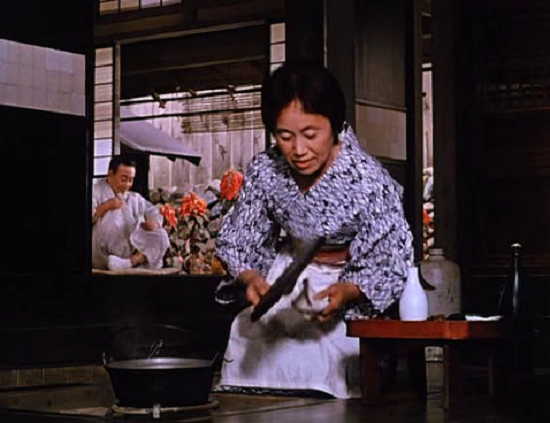
Oyoshi warming sake to welcome the return of Komajuro
Floating Weeds has a quiet directness that is completely absorbing and exhilarating and ultimately moving. The tale of an itinerant troupe which comes into the town, constructs its little Kabuki world and then fades into nothing is used as a perfect vehicle and symbol for what Ozu is consistently portraying in all his little plays: the transient troubling beauty of the world and the little intertwined dramas of human relationships.
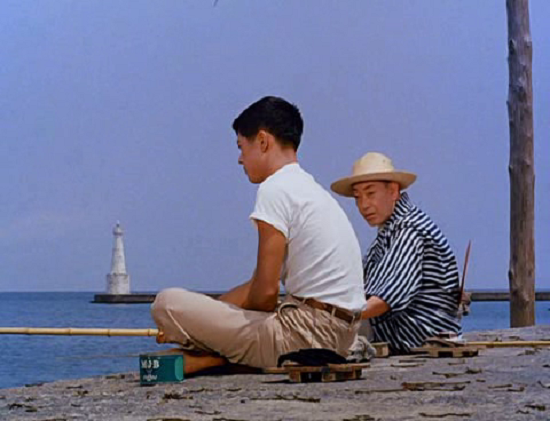
Fishing Scene: Father and son
Beginning with a travelling theatre troupe coming to a small seaside town, Floating Weeds looks at the complicated relationships between the group’s members and the local residents of the town as the actors live there for several months. The story largely concerns itself with the troubled ‘family affairs’ of the master of the group, Komajuro (Ganjirô Nakamura). Komajuro visits his former mistress, Oyoshi, who runs a small eatery in the town, during the itinerant trips to the town. However, his main purpose is to visit his illegitimate son Kiyoshi (Hiroshi Kawaguchi).
Kiyoshi, now grown up to be a fine young man, works at the post office as a mail clerk, aspiring to attend college in the big city. He does not know who Komajuro and treats him just as an uncle. We learn that "uncle" Komajuro hasn't been around to visit for the past 12 years, a significant stretch of time to miss in the course of a young man's life, so there's not much of a shared intimacy between the two - Komajuro is obviously delighted to see what a handsome fellow his son has blossomed into, whereas Kiyoshi just sees him as just an eccentric older relative but shows due respect while he's a guest at their home. He even goes for fishing with him. But Komajuro has kept his real identity as Kiyoshi’s father from his son because he does not wish his low social status as a travelling actor, and the vulgar circle he associates with to tarnish Kiyoshi’s future.
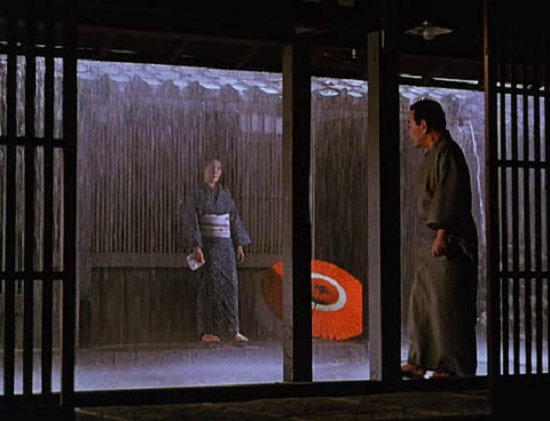
Heated argument between Sumiko and Komajuro
The plot thickens as Komajuro’s current mistress Sumiko finds out about his secrets. Burnt with anger and jealousy, she plots a scheme to destroy Kiyoshi by bribing the young actress Kayo to seduce him. The young man soon falls for the actress, but the scheme turns into a full-blown mutual love relation. Sadly, a marriage with Kayo would mean the quashing of his aspiration for higher education, and possible social reverberations and disgrace.
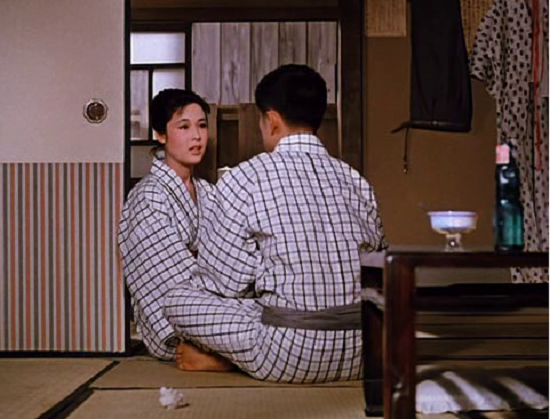
Kayo and Kiyoshi
In the meantime, the drama troupe hits a low with disappointing attendance. The company has to disband. Komajuro facing failure on different fronts has to make choices not only for himself, but the future of his son. In the final shot, the train that once took the travelling players to town now carries them off as disbanded individuals facing uncertain future. Like floating weeds, they drift on in the stream of life. And for Komajuro, he leaves town with the slim hope that his son would fare better than he in the oblivious currents of time.
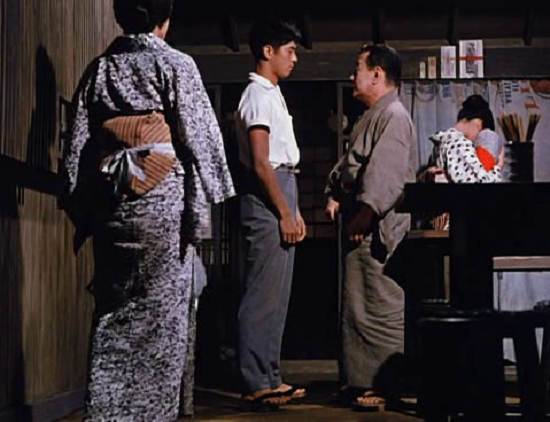
The Confrontation between the father and the son
It is wonderful to note how by the end of the story all of these central relationships undergo deep and resonant change. Ozu was a master of the family melodrama and the film exudes humanity from every pore. Characters feel real and emotionally complex without forcing this idea upon the viewer. They are flawed, but all the more interesting to watch for this very reason. As usual, most of the film unfolds in ‘around the table’ informal chats filled with small talk and pleasantries, with much being said ‘in-between the dialogue’ or in short sharp outbursts that prove all the more effective due to the surrounding restraint. The most powerful of these uncharacteristic moments here is a rainstorm-set argument between Komajuro and Sumiko where they each stand on either side of a rain-drenched street, a red umbrella separating them in the frame.
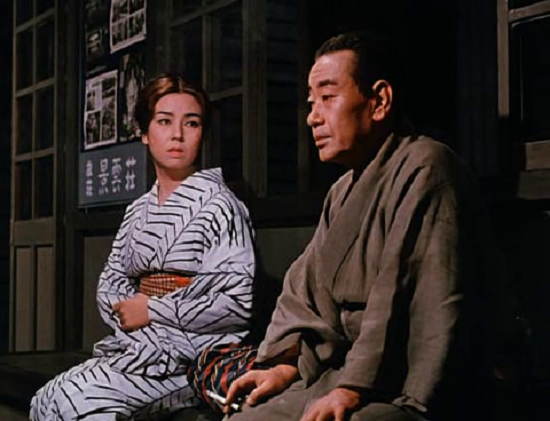
The reconciliation: Komajuro and Sumiko
Speaking of ‘the frame’, you can’t really talk about Ozu without paying reference to his composition. Ozu’s framing and handling of each scene is a joy to behold. He’s up to his usual tricks – low, static camera positions and unconventional head-on close-ups, but you can’t call it lazy when everything is so carefully constructed and meticulous. His imagery has a beauty that is hard to express. He doesn’t use elaborate lighting techniques or big, bold Leone-style perspective-trickery, he instead employs a simplistic elegance that is quietly stunning. This is one of his very few films in color and the combination of the cloudless blue skies, colorful costumes worn by the troupe and flashes of red and blue in the banners and posters around the town is enchanting.
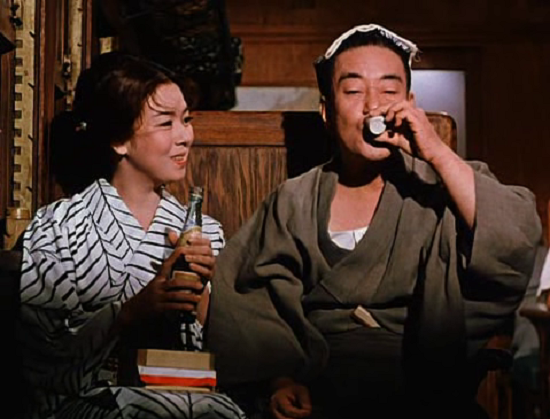
The happy journey to a new shore
This quiet, contemplative film offers a rich portrayal of Japanese village life. Director Yasujiro Ozu clearly has great affection for this setting and these characters. Ozu’s films are full of ellipses. There are story sequences he left out for the audience to bridge. He has handled the story with restraint and his subtle way of presenting the material is a very modern. He is not interested in histrionics or melodrama, but powerful emotions swell within his restrained approach. Little character moments accumulate until, by the end of the film, the entire cast is filled with familiar faces and we are deeply invested in their stories.
Floating Weeds is a brilliant film that asseverates Yasujiro Ozu as the unquestioned master of the domestic drama.
A series of "Hundred Favorite Films Forever"
10-Dec-2012
More by : P. G. R. Nair